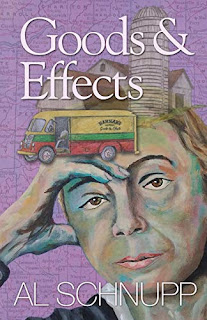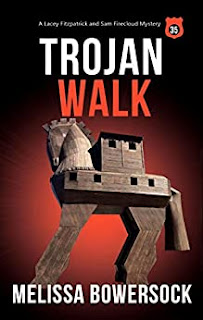Genre: Literary
Fiction
Description:
“Devastated by the death of her husband and sons, Hannah Mercer sells
the family farm and creates a store and living quarters in a delivery truck. As
she travels several circuits selling her wares, Hannah becomes the heart of a
network of interlinking lives: Nathan owns the motel where Hannah often parks
her truck. Darla is a young and talented deaf artist, whose parents let her
accompany Hannah on her rounds. Wanda, the sassy receptionist at a hardware
distribution center, has larger ambitions. Naomi, wife of the pious Mennonite
deacon, entertains fantasies of sexual freedom. Frank, a gentle farmer with a
chronically-ill wife, harbors great affection for Hannah, but has troubling biases.
LeRoy is a black farmer and talented singer, yet his family is subjected to
racial terrorism. Velma owns a woodworking shop. Is she a good match for
Vivian, Ronan County's elegant, lesbian librarian?
Larry... Maddie ... Tom... Molly. As time passes and Hannah's
relationships deepen, her faith diminishes but her vision of humanity expands.
Hannah Mercer is a clever problem-solver, a shrewd schemer, a spinner of tender
lies, an advocate for justice, and a dream weaver.”
Author:
A former member of the faculty at California Polytechnic State
University, San Luis Obispo where he worked in the Theatre and Dance
Department, Al Schnupp is now retired. While his education and career has been
almost exclusively in the dramatic arts, he has had a couple of screenplays
that he’s reworked into books.
Appraisal:
When I finished this novella and was pondering what I thought about it
a few thoughts were easy. I liked it, largely because I liked the main
character, Hannah, as well as most of the other characters who appear
frequently, especially Darla, the talented deaf artist who, although she has good
parents, got a third parent in Hannah.
But I realized that what the point of the story was, unlike what you’d
get in many genres whether thriller, mystery, romance, fantasy, or the vast
majority of other genres of fiction, wasn’t clear. I think part of that is the
literary fiction genre that this book falls into doesn’t create as many
expectations for a story to fit. I also pondered whether the development of
this book, originally a screenplay idea the author had started on years before
that he decided to turn into a novel, might have something to do with it.
In the end I wasn’t sure if the author had something he hoped the
reader would take away from the story or not, but I could think of several
possibilities that ultimately come down to what the reader chooses to take
away. In the meantime, it also allows the reader to experience something that
they probably haven’t in real life. That includes life on the fringes of a Mennonite
community in middle America in the early 60s, a bit of a look into the
difficulties of being deaf, and many other experiences that most of us aren’t
likely to go through. Even as I struggled to figure out why, the one thing I
was sure of is that I was glad I’d gone on this journey and got to know Hannah
and her cohorts.
Buy now
from: Amazon US Amazon UK
Format/Typo
Issues:
No significant issues
Rating: ****
Four Stars
Reviewed
by: BigAl
Approximate
word count: 35-40,000 words








